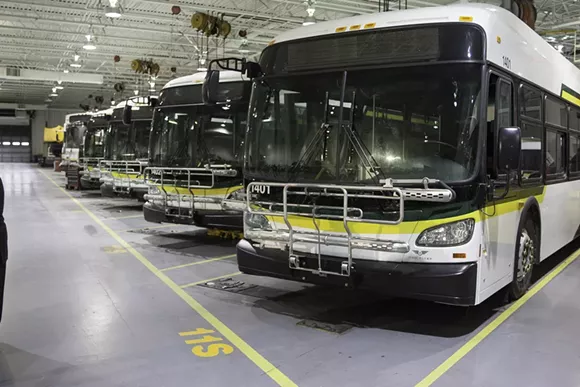The Regional Transit Authority of Southeast Michigan board was unable to gather the support necessary Thursday to include a $4.6 billion public transportation plan on local ballots this November. Standing in the way of the initiative, which has been lauded by many as an important step towards equity in the region, were objections from Macomb and Oakland County.
In order to get the millage measure on the November ballot (and in the hands of Michigan citizens) the RTA boarded needed to get the thumbs up from seven of its nine members; more specifically, at least one rep from Wayne, Oakland, Macomb and Washtenaw county had to approve the proposal.
The four representatives comprising Macomb and Oakland, however, denied the plan — and with only two weeks before all ballot initiatives need to be submitted, this leaves board members — and advocates of the transit plan — in a tough spot.
The news, while disappointing to many who hoped the 20-year plan would finally tackle some of the region's unaddressed transit issues, is not exactly surprising. As we reported last week, Oakland County Executive L. Brooks Patterson (do not continue reading until you've taken in this New Yorker profile on him) and Macomb County Executive Mark Hackle have been more than vocal in their disdain for the plan.
"I cannot in good conscience support the current plan, which spends over $1.3 billion of Oakland County taxpayers’ dollars over 20 years, but only gives our businesses, workforce, and residents a fraction of that back in transit services," Patterson said in a statement last week.
Hackle reiterated many of Patterson's points last week saying the plan "falls short" and that it is "difficult for us to support a more than $4-billion commitment over the next two decades which could negatively impact our county’s longstanding commitment to transit, especially the SMART system [the suburban bus system]."
The duo — in a joint press release last week — expressed concern about how the RTA board was set up. In their opinion the board should require a unanimous vote, rather than a majority, when deciding how and where to use funding and services.
These sentiments were reiterated during the vote Thursday when, according to the Detroit Free Press, Chuck Moss, an Oakland County representative explained that he felt the plan didn't provide regional transit but rather "regional taxation" and that residents in his county were "screaming bloody murder that they’re going to have to pay" for transportation that didn't directly benefit their area (under the 20-year plan, a 1.2-mill property tax would be required to pay for the expansion and update of the RTA system).
Advocates for the plan are frustrated that Oakland and Macomb county are not letting the initiative be decided by voters in the four counties. As there are now as little as one-week before the plan can be approved to send to voters, proponents are scrambling to accommodate the demands of Oakland and Macomb county.
"Our eagerness to do whatever is possible to work things out in a positive manner,” Detroit's representative on the board Freman Hendrix told the Detroit Free Press.
According to Hendrix, he spoke with Mayor Mike Duggan yesterday and was told that the city of Detroit will do whatever is necessary to appease the two dissatisfied counties.
In May — in the lead up to today's vote — A Coalition for Transit (ACT) set up a local "challenge" where they asked residents to use public transit to get to get too and from work. The goal: Do your commute in 90 minutes or less.
According to ACTS spokeswoman Kelly Rossman-McKinney less than a quarter of jobs in Southeast Michigan can currently be reached in 90 minutes using public transit. Why? The region currently lacks a "frerequent, coordinated regional transit system."
"This challenge is about illuminating the unfortunate disconnect between Southeast Michigan’s four counties and the issues it presents for people getting to work, essential appointments and a variety of other opportunities,” Rossman-McKinney said in May.
The plan that was rejected today was meant to address this.
- Local Detroit
- News & Views
- Things to Do
- Arts & Culture
- Food & Drink
- Music
- Weed
- Detroit in Pictures
- About Metrotimes
- About Us
- Advertise
- Contact Us
- Jobs
- Staff
- Big Lou Holdings, LLC
- Cincinnati CityBeat
- Detroit Metro Times
- Louisville Leo Weekly
- St. Louis Riverfront Times
- Sauce Magazine


